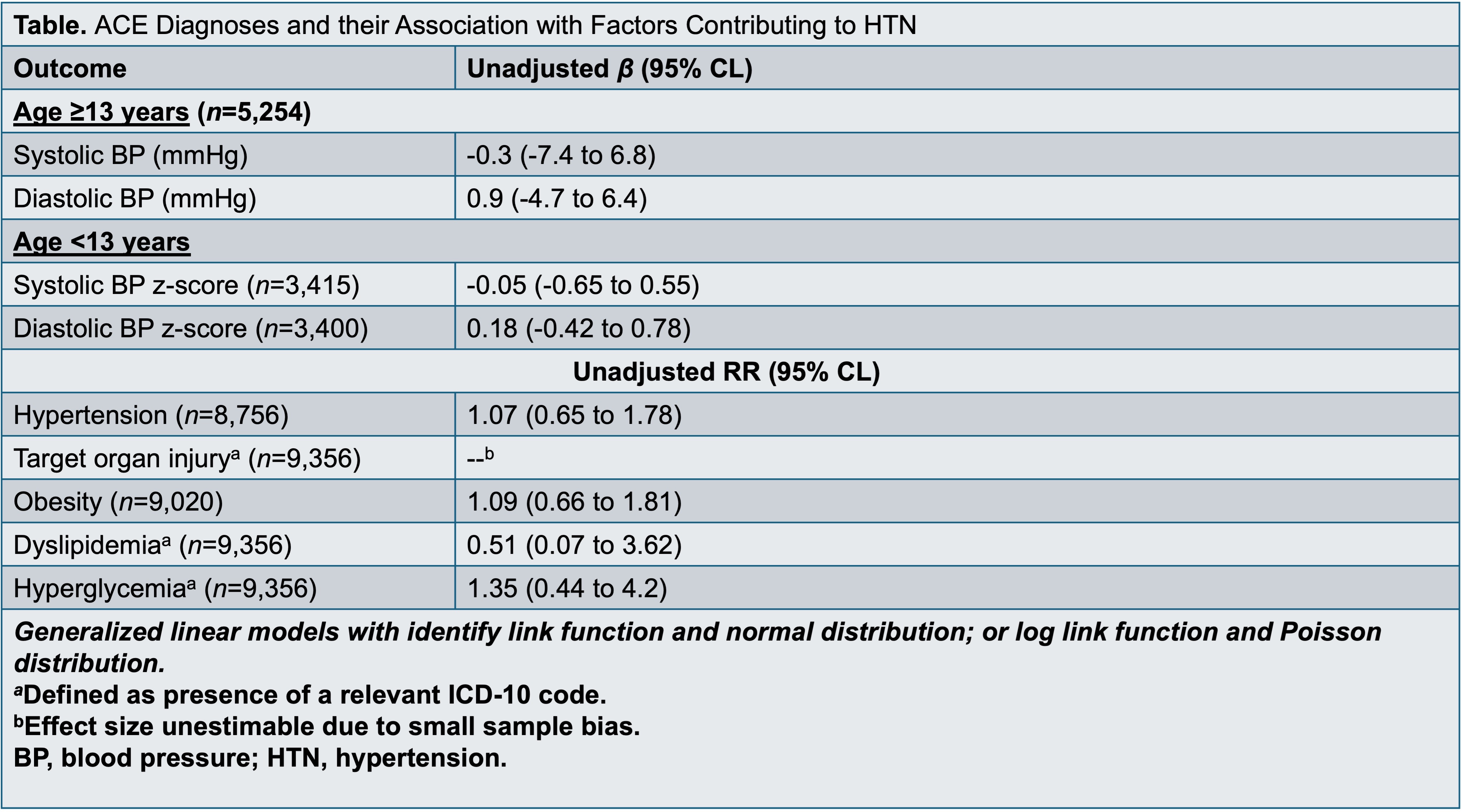Hypertension
Session: Hypertension
031 - Association of Adverse Childhood Experience Diagnosis with Blood Pressure Severity and Cardiovascular Health at Baseline in Youth Receiving Subspecialty Hypertension Care: A SUPERHERO Analysis
Saturday, April 26, 2025
2:30pm - 4:45pm HST
Publication Number: 31.3976
Logan M. Cave, Wake Forest School of Medicine of Wake Forest Baptist Medical Center, Winston Salem, NC, United States; Alexis Roberts, Wake Forest School of Medicine of Wake Forest Baptist Medical Center, Winston-Salem, NC, United States; Landon T. Sanz, Wake Forest School of Medicine of Wake Forest Baptist Medical Center, Spring, TX, United States; Daniel L. Byrge, Wake Forest School of Medicine of Wake Forest Baptist Medical Center, Winston-Salem, NC, United States; Beatrice Gar, Wake Forest School of Medicine of Wake Forest Baptist Medical Center, Winston-Salem, NC, United States; Hannah Menaker, Wake Forest School of Medicine of Wake Forest Baptist Medical Center, Winston-Salem, NC, United States; Breanka Moore, Wake Forest School of Medicine of Wake Forest Baptist Medical Center, Winston Salem, NC, United States; Margaret Murphy, University of Kentucky College of Medicine, Lexington, KY, United States; Andrew M. South, Wake Forest School of Medicine of Wake Forest Baptist Medical Center, Winston Salem, NC, United States
.jpg)
Alexis Roberts, Quantitative Biology, B.S. (she/her/hers)
Biomedical Sciences Masters Student
Wake Forest School of Medicine of Wake Forest Baptist Medical Center
Winston-Salem, North Carolina, United States
Presenting Author(s)
Background: Adverse childhood experiences (ACEs) are traumatic events that occur between birth and age 17. ACEs are associated with poor cardiovascular (CV) health and occurrence of adverse CV events in adulthood. Preliminary studies show possible associations between ACEs and youth-onset hypertension (HTN), but there is much that remains unknown.
Objective: Examine the association between ACEs and blood pressure (BP) severity, obesity, hyperglycemia, and dyslipidemia in youth with HTN disorders at baseline.
Design/Methods: Cross-sectional analysis of baseline data acquired from SUPERHERO, a Registry containing electronic health record data for youth referred to subspecialists treating HTN disorders. Data analyzed included patients aged < 19 years from 7 sites between 1/1/2016 and 12/31/2023. SUPERHERO excludes kidney transplant, kidney failure on dialysis, and pregnancy by ICD-10 codes. Exposure criteria were having at least one of the following ACE diagnoses by ICD-10 codes: Z60 (social environment), Z62 (upbringing), or Z63 (other problems related to primary support group). Outcomes were BP severity (measured), obesity by BMI percentiles per US guidelines, and hyperglycemia and dyslipidemia by ICD-10 codes. Bivariate generalized linear models were used to determine possible associations between ACEs and the outcomes.
Results: Of 9,356 participants, 38% were female and median age was 14.0 years (IQR 10.5, 16.3). An ACE diagnosis was present among 0.2% (n=22) of participants. We found no significant association between ACEs and BP severity (Table). Similarly, an ACE diagnosis was not significantly associated with risk of HTN (RR 1.07, 95% CL 0.65–1.78), obesity (RR 1.09, 95% CL 0.66–1.81), dyslipidemia (RR 0.5, 95% 0.07 to 3.62), or hyperglycemia (RR 1.35, 95% CL 0.44 to 4.2).
Conclusion(s): Among youth with HTN disorders enrolled in SUPERHERO, we observed no significant associations between ACEs and measured CV health risk factors. Given the extremely low prevalence of ACEs by ICD-10 codes, ongoing steps for SUPERHERO include collecting patient social histories to better define and identify ACEs, especially in historically marginalized populations. Future directions for SUPERHERO include prospective and longitudinal assessment of ACEs to understand mechanisms responsible for their association with adverse CV events in adults. Findings could inform early detection and interventions in youth that mitigate the risk of adverse CV events in adulthood.
Table: ACE Diagnoses and their Association with Factors Contributing to HTN


